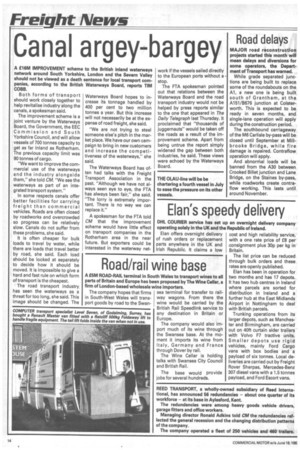Canal argey-bargey
Page 16

If you've noticed an error in this article please click here to report it so we can fix it.
should not be viewed as a death panies, according to the British COBB.
Both forms of transport should work closely together to help revitalise industry along the canals, a spokesman said.
The improvement scheme is a joint venture by the Waterways Board, the Government, the EEC Commission and South Yorkshire Council, and will allow vessels of 700 tonnes capacity to get as far inland as Rotherham. The previous capacity limit was 90 tonnes of cargo.
"We want to improve the cornmercial use of the waterways and the industry alongside them," she told CM. "We see the waterways as part of an integrated transport system."
In some respects canals offer better facilities for carrying freight than commercial vehicles. Roads are often closed by roadworks and overcrowded so progress can be relatively slow. Canals do not suffer from these problems, she said.
It is often cheaper for bulk loads to travel by water, while there are loads that travel better by road, she said. Each load should be looked at separately to decide how it should be moved. It is impossible to give a hard and fast rule on which form of transport is the cheapest.
The road transport industry has seen the waterways as a threat for too long, she said. This image should be changed. The Waterways Board hopes to increase its tonnage handled by 400 per cent to two million tonnes a year. But this increase will not necessarily be at the expense of road freight, she said.
"We are not trying to steal someone else's pitch in the market place. We have our own campaign to bring in new customers and increase the competitiveness of the waterways," she said.
The Waterways Board has often had talks with the Freight Transport Association in the past. "Although we have not always seen eye to eye, the FTA has always been fair," she said. "The lorry is extremely important. There is no way we can replace it."
A spokesman for the FTA told CM that the improvement scheme would have little effect on transport companies in the Rotherham area in the near future. But exporters could be interested in the waterway net
work if the vessels sailed directly to the European ports without a stop.
The FTA spokesman pointed out that relations between the Waterways Board and the road transport industry would not be helped by press reports similar to the one that appeared in The Daily Telegraph last Thursday. It proclaimed that "thousands of juggernauts" would be taken off the roads as a result of the improvement scheme. Apart from being untrue the report simply widened the gap between both industries, he said. These views were echoed by the Waterways Board.








































































































